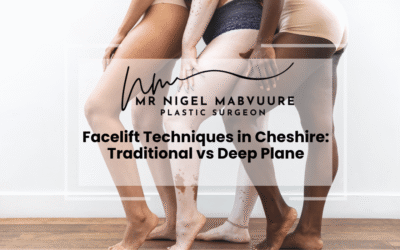Key Takeaways: The Psychological Impact of Facelifts
- Facelifts offer legitimate psychological benefits beyond aesthetic improvements, including increased self-confidence and reduced appearance-related anxiety.
- Scientific research confirms that facial rejuvenation can significantly improve self-perception, with 97% of patients reporting enhanced self-confidence.
- The psychological benefits stem from resolving the disconnect between internal vitality and external appearance, creating harmony between self-image and appearance.
- Mental wellbeing improvements after facelifts include decreased social anxiety, greater comfort in public settings, and improved overall life satisfaction.
- Setting realistic expectations and proper mental preparation are crucial for achieving positive psychological outcomes from facial rejuvenation.
- The most satisfied patients view their facelift as part of a holistic approach to wellbeing rather than a complete solution to aging or life challenges.
Table of Contents
- Understanding the Psychology Behind Facial Appearance
- How Does a Facelift Impact Self-Perception and Confidence?
- The Science of Self-Esteem: Emotional Benefits of Facial Rejuvenation
- Beyond Vanity: Legitimate Psychological Benefits of Facelifts
- Can a Facelift Actually Improve Your Mental Wellbeing?
- Real Patient Stories: Transformative Emotional Journeys After Surgery
- Preparing Mentally for Your Facelift: Setting Realistic Expectations
- Life After Surgery: Maintaining Confidence and Emotional Balance
Understanding the Psychology Behind Facial Appearance
Our faces represent more than just physical features; they embody our identity, emotions, and how we connect with others. The psychological impact of facial appearance runs remarkably deep, influencing how we perceive ourselves and how society perceives us. Research in social psychology consistently demonstrates that facial appearance significantly affects first impressions, social interactions, and even professional opportunities.
As we age, the gradual changes in our facial structure—sagging skin, deepening lines, and volume loss—can create a disconnect between our internal sense of self and our external appearance. Many individuals report feeling “trapped” in a face that no longer reflects their inner vitality and energy. This misalignment between self-image and appearance can trigger various psychological responses, including decreased confidence, social withdrawal, and even symptoms of anxiety or depression in some cases.
The facelift confidence boost many patients seek isn’t merely about vanity; it’s about restoring harmony between one’s inner identity and outer appearance. Understanding this psychological foundation helps explain why facial rejuvenation procedures often yield benefits that extend far beyond aesthetic improvements. The face we present to the world profoundly shapes our social experiences and emotional wellbeing, making the psychological benefits of facelift procedures a legitimate area of consideration for both patients and practitioners.
How Does a Facelift Impact Self-Perception and Confidence?
The relationship between a facelift and confidence is multifaceted and deeply personal. For many patients, the facelift emotional impact begins with addressing specific concerns that have affected their self-perception—whether it’s jowls that create a permanently tired appearance, neck laxity that ages beyond their years, or deep folds that convey sadness or anger when they feel neither. By addressing these specific concerns, a facelift can help realign external appearance with internal self-image.
Clinical studies have documented significant improvements in body image and self-esteem after facelift procedures. One notable study published in the Plastic and Reconstructive Surgery Journal found that 97% of patients reported improved self-confidence following facial rejuvenation surgery. This boost in confidence typically manifests in various aspects of daily life:
- Increased willingness to participate in social activities
- Greater comfort in professional settings and career advancement
- Renewed interest in dating and romantic relationships, particularly for older singles
- More frequent engagement in photographs and family documentation
- Reduced anxiety about age-related appearance concerns
The psychological benefits of facelift procedures often create a positive feedback loop: as patients feel better about their appearance, they project more confidence, which in turn elicits more positive social responses, further reinforcing their improved self-perception. This cycle helps explain why the confidence boost from a successful facelift often seems disproportionately large compared to the physical changes alone.
The Science of Self-Esteem: Emotional Benefits of Facial Rejuvenation
The emotional benefits of facial rejuvenation are increasingly supported by scientific research. Psychologists have identified several mechanisms through which facelifts contribute to improved self-esteem and emotional wellbeing. Understanding these processes helps explain why self-esteem after facelift procedures often shows measurable improvement.
Firstly, facial appearance plays a crucial role in our social identity. Our brains are specifically wired to process faces, and we form impressions within milliseconds of seeing someone. When facial ageing creates an appearance that doesn’t match our internal sense of self, it can create what psychologists call “identity dissonance”—a uncomfortable mismatch between how we feel and how we look. Facial rejuvenation can help resolve this dissonance, creating greater harmony between internal and external self.
Secondly, research in the field of embodied cognition suggests that our physical appearance influences our emotional states and behaviours. When patients see a refreshed, more youthful version of themselves after recovery, they often naturally adopt more positive emotional states and confident behaviours. This phenomenon, sometimes called the “facial feedback hypothesis,” suggests that our facial appearance doesn’t just reflect our emotions—it can actually help shape them.
Finally, neuroimaging studies have shown that when individuals view images of themselves that they find attractive, there is increased activity in brain regions associated with reward and positive emotion. This neurological response helps explain why the long-lasting results of a well-performed facelift can contribute to sustained improvements in mood and outlook.
Beyond Vanity: Legitimate Psychological Benefits of Facelifts
The decision to undergo a facelift is often mischaracterised as purely cosmetic or vain, yet research consistently demonstrates legitimate psychological benefits that extend far beyond appearance. Understanding these benefits helps reframe facial rejuvenation as a holistic intervention that addresses both physical and psychological aspects of ageing.
One significant psychological benefit is the reduction in appearance-related anxiety. Many individuals experience increasing anxiety about their ageing appearance, particularly in professional contexts where ageism remains prevalent. Studies show that facial rejuvenation can significantly reduce this specific form of social anxiety, allowing individuals to focus more on their work and relationships rather than concerns about how they’re being perceived.
Another important psychological benefit relates to mood disorders. While a facelift isn’t a treatment for clinical depression, research has found correlations between facial rejuvenation procedures and improvements in depressive symptoms for some patients. A 2013 study in the Journal of Clinical Psychiatry found that patients who underwent facial rejuvenation showed significant reductions in depression and anxiety scores six months after their procedures.
The psychological benefits of facelift procedures also include improvements in body image disturbance. Many ageing individuals experience distress when looking in mirrors or seeing photographs of themselves, sometimes avoiding these situations entirely. Facial rejuvenation can help restore a more positive relationship with one’s own image, reducing avoidance behaviours and improving quality of life.
These legitimate psychological benefits highlight why facial rejuvenation should be viewed through a broader lens than mere aesthetics—for many patients, the decision addresses genuine psychological concerns that impact daily functioning and wellbeing.
Can a Facelift Actually Improve Your Mental Wellbeing?
The question of whether a facelift can improve mental wellbeing has been the subject of increasing scientific scrutiny, with compelling evidence suggesting positive outcomes for many patients. While individual results vary, research indicates several pathways through which facial rejuvenation may contribute to improved mental health.
A landmark study published in the Aesthetic Surgery Journal followed patients for one year after facial rejuvenation procedures and found significant improvements in quality of life measures, including mental wellbeing indicators. Patients reported decreased social anxiety, improved comfort in public settings, and greater overall life satisfaction. These improvements remained stable throughout the follow-up period, suggesting lasting psychological benefits.
The relationship between appearance and mental wellbeing becomes particularly significant as we age. Society often equates facial ageing with declining competence, energy, and relevance—unfair associations that can nevertheless affect how older individuals are treated. By addressing visible signs of ageing, a facelift can help mitigate these negative social experiences, potentially reducing their psychological impact.
It’s important to note that facial rejuvenation is not a substitute for proper mental health treatment when clinical conditions exist. However, for individuals experiencing appearance-related distress, the facelift emotional impact can include meaningful improvements in day-to-day mental wellbeing. The key factors that influence these outcomes include:
- Realistic expectations before surgery
- Quality of surgical outcomes
- Supportive recovery environment
- Pre-existing psychological resilience
- Absence of body dysmorphic tendencies
When these factors align positively, many patients report that their facelift contributed significantly to improved mental wellbeing and overall life satisfaction.
Real Patient Stories: Transformative Emotional Journeys After Surgery
The emotional journeys of facelift patients often reveal the profound psychological impact these procedures can have. While maintaining patient confidentiality, we can share composite experiences that represent common emotional trajectories following facial rejuvenation surgery.
Margaret, a 62-year-old university professor, sought a facelift after noticing students increasingly commented on her “tired” appearance despite her high energy levels. “I wasn’t tired—I was passionate about my work, but my face was sending the wrong message,” she explained. Six months after her procedure, Margaret reported a transformative change in classroom dynamics. “Students engage more readily, and I’ve received the highest teaching evaluations of my career. The confidence I feel has changed how I teach.”
For Robert, a 58-year-old recently divorced man re-entering the dating scene, his facelift addressed deep insecurities about appearing significantly older than he felt. “I wasn’t looking to appear 30 again—I just wanted my outer appearance to match my inner vitality.” After recovery, Robert described feeling “reconnected” with himself. “It wasn’t about attracting partners, though that happened too. It was about recognizing myself in the mirror again.”
Catherine, 67, sought facial rejuvenation after avoiding family photographs for years. “I was missing from my grandchildren’s visual history because I couldn’t bear to see myself aging so dramatically.” Her post-surgery emotional journey included tearful joy at being present in family albums again. “The psychological relief of not hiding anymore—that’s been the greatest gift.”
These narratives highlight how the facelift confidence boost often extends beyond appearance to fundamental aspects of identity, social connection, and emotional wellbeing. While results vary for each individual, these representative stories illustrate the potential for meaningful psychological transformation.
Preparing Mentally for Your Facelift: Setting Realistic Expectations
Mental preparation is as crucial as physical preparation when considering a facelift. Setting realistic expectations forms the foundation for positive psychological outcomes and satisfaction with results. Understanding the emotional journey ahead helps patients navigate both the recovery process and the adjustment to their new appearance.
First and foremost, it’s essential to clarify your motivations. The strongest psychological benefits come when patients seek facial rejuvenation for themselves rather than to please others or save relationships. Take time for self-reflection about what you hope to achieve emotionally from the procedure. Are you seeking to align your appearance with your internal sense of self? Address specific concerns that affect your confidence? Understanding your core motivations helps establish healthy expectations.
It’s equally important to understand what a facelift can and cannot accomplish. While the psychological benefits of facelift procedures can be significant, facial rejuvenation won’t solve unrelated life problems or completely transform your identity. The healthiest approach views a facelift as enhancing your existing self rather than creating an entirely new one.
The recovery period itself requires mental preparation. Temporary swelling, bruising, and the initial shock of seeing your changed appearance can trigger emotional responses ranging from doubt to anxiety. Understanding that these reactions are normal parts of the adjustment process helps patients maintain perspective during recovery. Many surgeons recommend:
- Preparing a support system of understanding friends or family
- Planning restful activities during the initial recovery period
- Avoiding major life decisions or stressors during recovery
- Maintaining open communication with your surgical team about emotional concerns
- Considering pre-surgical counselling if you have significant appearance anxiety
With proper mental preparation, patients are better positioned to experience the full psychological benefits that can accompany successful facial rejuvenation.
Life After Surgery: Maintaining Confidence and Emotional Balance
The journey doesn’t end once surgical recovery is complete. Maintaining the psychological benefits of your facelift requires ongoing attention to emotional balance and healthy perspectives about appearance. Many patients find that the facelift confidence boost initiates positive life changes that require nurturing and integration into their broader identity.
One key aspect of maintaining emotional balance is developing a healthy relationship with your new appearance. This includes accepting the natural ongoing ageing process while appreciating the refreshed foundation your facelift has provided. Patients who view their facelift as part of their self-care journey rather than a permanent solution to ageing tend to maintain higher satisfaction over time.
Self-esteem after facelift procedures can be reinforced through complementary lifestyle practices. Many patients report that their facial rejuvenation motivated them to adopt healthier habits overall—improved skincare routines, better nutrition, regular exercise, stress management, and reduced smoking or alcohol consumption. These positive changes create a virtuous cycle, enhancing both appearance and emotional wellbeing.
Social reintegration represents another important dimension of life after surgery. As friends and colleagues respond to your refreshed appearance, you may experience shifts in social dynamics. Most patients report positive changes, including increased social invitations and professional opportunities. Navigating these changes with authenticity helps integrate your external transformation with your internal sense of self.
Finally, maintaining perspective about the role of appearance in overall life satisfaction remains crucial. While the facelift emotional impact can be significant, balanced wellbeing depends on nurturing multiple life dimensions—relationships, purpose, intellectual growth, and spiritual connection. The most satisfied patients are those who appreciate their refreshed appearance while continuing to invest in these broader aspects of a fulfilling life.
By approaching facial rejuvenation as one component of holistic wellbeing rather than its foundation, patients can enjoy sustained psychological benefits while maintaining healthy emotional balance in the years following their procedure.
Frequently Asked Questions
Do facelifts really improve self-confidence?
Yes, research shows that facelifts significantly improve self-confidence for most patients. Clinical studies have documented that approximately 97% of patients report improved self-confidence following facial rejuvenation surgery. This confidence boost typically manifests as increased social participation, greater comfort in professional settings, and reduced anxiety about appearance-related concerns.
How long do the psychological benefits of a facelift last?
The psychological benefits of a facelift can last for many years. Studies following patients for 12+ months post-procedure show stable improvements in quality of life measures and mental wellbeing indicators. While physical results gradually change with continued aging, the psychological benefits often persist as patients maintain a more positive relationship with their appearance and experience lasting improvements in social comfort and self-perception.
Can a facelift help with depression or anxiety?
A facelift may help reduce symptoms of mild depression or anxiety related to appearance concerns, but it’s not a treatment for clinical mental health conditions. Research published in the Journal of Clinical Psychiatry found significant reductions in depression and anxiety scores six months after facial rejuvenation procedures for some patients. However, individuals with diagnosed mental health conditions should seek appropriate psychological treatment alongside any cosmetic procedures.
What’s the difference between wanting a facelift for vanity versus psychological wellbeing?
The key difference lies in motivation and expected outcomes. Seeking a facelift primarily for psychological wellbeing involves addressing specific concerns that affect daily functioning, social comfort, and alignment between internal identity and external appearance. These patients typically have realistic expectations about outcomes and view the procedure as restoring harmony rather than achieving perfection. In contrast, vanity-driven motivations often involve unrealistic expectations, comparison to others, or beliefs that the procedure will solve unrelated life problems.
How can I prepare mentally for a facelift?
Mental preparation for a facelift should include: clarifying your personal motivations, setting realistic expectations about outcomes, preparing for the emotional aspects of recovery (including temporary swelling and bruising), establishing a support system, and understanding that adjustment to your new appearance takes time. Some patients benefit from pre-surgical counseling, particularly those with significant appearance anxiety. Proper mental preparation significantly increases satisfaction with results and enhances psychological benefits.
Will people treat me differently after a facelift?
Many patients do experience changes in how others respond to them after facial rejuvenation. Research in social psychology shows that more youthful, refreshed appearances often elicit more positive social responses, including increased eye contact, friendlier interactions, and greater attribution of positive personality traits. However, these changes typically feel natural rather than jarring, especially when the facelift results are subtle and harmonious rather than dramatically different from your pre-procedure appearance.
How do I know if I’m seeking a facelift for the right reasons?
You’re likely seeking a facelift for psychologically healthy reasons if: you’re doing it primarily for yourself rather than to please others; you have specific concerns rather than general dissatisfaction with life; you understand what the procedure can and cannot accomplish; you’re not expecting it to completely transform your identity or solve unrelated problems; and you view it as enhancing your existing self rather than creating an entirely new one. Consulting with both a qualified surgeon and a mental health professional can help clarify your motivations.




